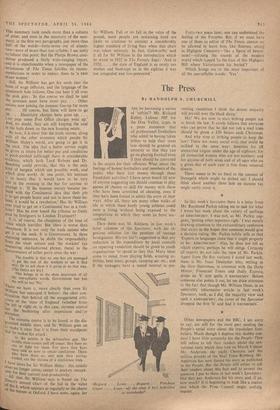The Press
By RANDOLPH S. CHURCHILL ARE we becoming a nation of 'softies'? Mr. Richard Kelley, Labour MP for the Don Valley, urges in a press statement that all professional footballers who admit to having taken bribes to help their team lose should be granted an amnesty so that they can go on playing football even if they should be convicted in the courts for their offences. What about the feelings of honest footballers and members of the public who have lost money through these fraudulent activities? I have never heard till now of anyone suggesting one should continue to play games of chance or skill for money with those who have been convicted of cheating, even if they have been forced to admit the error of their ways. After all, there are many other walks of life in which these hardy young athletes could earn a living without being exposed to the temptations to which they seem to have suc- cumbed.
Then there was M. Eddison, in last week's letter columns of the Spectator, with his in- genious solution for the problem of teenage hooliganism. His (or her?) suggestion is that any reduction in the expenditure by local councils on repairing vandalism should be given to youth organisations `to spend as they like. Many ideas come to mind, from playing fields, scouting ac- tivities, beat music groups, camping etc. etc.; and if the teenagers have a vested interest in pre-
4Bequest . . . Loan . . . Bequest . . Purchase Grant . . . Loan—all the time I feel beholden to somebody!' venting vandalism I think the decent majority will prevail over the black sheep.'
Ho! We are now 'to start bribing people not to break the law. It surely follows that everyone who can prove that he did not rob a mail train should be given a £50 bonus each Christmas.
And why stop at bribing people to keep the law? There are many social evils that could be tackled in the same way: bounties for all unmarried virgins under the age of eighteen; for all unmarried women who are not mothers; and for anyone of both sexes and of all ages who on a given day of each year, is free from venereal disease.
There seems to be no limit to the amount of Danegeld which might be dished out. I should think about another three bob on income tax might easily cover it.
In this week's Spectator there is a letter from Mr. Raymond Parkin taking me to task for what I wrote last week about the variety of spellings of KHRUSHCHEV. I was not, as Mr. Parkin sug- gests, 'putting other reporters right.' I was merely drawing attention to the extraordinary confusion that exists in the hopes that someone would give a decisive ruling. Mr. Parkin loftily tells us that `Experts in languages insist that it ought properly to be: KHRUSHCHOV.' Alas, he does not tell us which, experts; perhaps he will oblige. Certainly all experts do not take the view of Mr. Parkin. Apart from the five variants I noted last week, there is Mr. Isaac Deutscher who, writing in the New Statesman, in common with the Daily Mirror, Financial Times and Daily Express, drops an 'h' and spells it KRUSHCHEV. Before someone else points it out, let me drsaw attention to the fact that though Mr. William Dean, in an admirably informative article in last week's Spectator, took, as I did, the majority view and spelt it KHRUSHCHEV, the cover of the Spectator dropped the first 'h' and had it KRUSHCHEV.
* Other newspapers and the BBC, I am sorry to say, are still for the most part stealing the People's serial story about the fraudulent foot- ballers. Much though I deplore this shabby con- duct I have little sympathy for the People. They still refuse to tell their readers about the sen- sational story which they told on March 8 about Mr. Anderson, the yacht Christine and the million pounds of the Mail Train Robbery. Mr. Anderson has now denied his story as published in the People. But the People still refuse to tell their readers about this fact and to answer the question I put to them in last week's Spectator: Did they pay Anderson for his story and, if so, how much? It is; beginning to look like a matter into which the Press Council might usefully inquire.






































 Previous page
Previous page